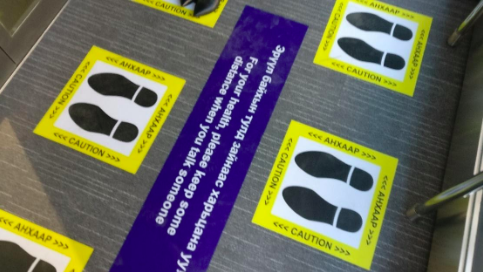Ulaanbaatar: Facing the pandemic in -18°C
- Job Zomerplaag
- Apr 20, 2020
- 4 min read
Updated: Apr 21, 2020
Despite some pressure from his university encouraging him to return home, Felix Thiessen decided to stay in Ulaanbaatar during the global outbreak of Covid-19. Felix, a German student studying in the Netherlands, is currently doing an internship and field research in Mongolia's capital: the virus outbreak of the virus did disturb his initial plans of fully experiencing the country and its great nature. However, as he reflects on the experience of facing the pandemic in -18 degrees Celsius, he believes Mongolia has done very well so far and deserves a lot of respect.
A few weeks after my arrival in mid-January in Ulaanbaatar, Mongolia, for my field-research and an internship at a Mongolian Bank, Covid-19 frustrated my plans of fully experiencing the country and its great nature. Big times, actually. However, the country and its people have done very well so far and they deserve a lot of respect for the successful measures taken, even if restrictions meant an annoying burden in the beginning.
In late January, without being fully aware of an approaching global pandemic, people started to wear masks more commonly than is usual in an Asian country. I realised that something unpredictable was going to happen, when news reporters and public officials started to wear masks on public TV. This early development led to some witty moments, when even at -18 degrees Celsius people wore their masks, which ended up as ice clusters in front of their faces. Also, spotting people sitting alone in their cars wearing masks will be an unforgettable memory. Time passed and the government imposed increasingly tough measures, closing down the universities and schools, extending kids' usual four weeks winter holidays ultimately and indefinitely. This was followed in mid-February by the closure of public and leisure places like gyms, swimming pools, museums and clubs and limiting opening hours of bars and restaurants to 10 pm.
'Even at -18 degrees Celsius people wore their masks, which ended up as ice clusters in front of their faces'
At a time when the European media narrative on Corona still framed the virus as a temporary disease only affecting China and its Asian neighbours, Mongolians reconciled themselves with the circumstances because they trusted in and complied with the measures imposed by the government - an interesting feature that the pandemic brought to Mongolia, since trust in the government is usually rather moderate. Furthermore, Mongolians had to give up their Tsagaan Sar preparations, which take place every year around February and March to celebrate the Mongolian Lunar New Year. It is a very important holiday in Mongolia: three days during which family, relatives, friends and neighbours visit each other. However, these celebrations were suspended this year, due to social distancing and restrictions preventing 'mass gathering'.
Days went by and February passed, without any confirmed case in the country. The government decided to temporarily suspend flights to China, then Korea and Japan. All of a sudden, the first case occurred in March which temporarily left the country in shock, changing the situation and increasing the pressure on non-Mongolians to leave the country. Luckily, my lovely American roommates decided to stay. Despite some pressure from my university encouraging me to leave, I decided to stay as well.
The first case happened to be a French citizen, who visited Mongolia for a business trip. In the following days, restrictions were tightened and companies started to move their work into home offices. Furthermore, the atmosphere worsened, especially due to social media channels that blamed foreign powers for bringing the virus to Mongolia in order to get access to its vast resources. Unfortunately, the French businessmen visited my office tower as well, which meant a forced week of home-office for me. However, luckily, I could return to work one week later.

In the following weeks, the government of Mongolia evacuated Mongolian citizens from different countries who were stuck abroad. The number of confirmed cases increased to 14, since some of the evacuees were infected by the virus and infected others on the plane. However, until then no local case had been reported, which relaxed the atmosphere a bit.
In the past week, panic reemerged when the health ministry announced two suspected local cases. Everyone was getting nervous again and preparing for a total shut down. Some rumours spread, saying that the government wanted to stop the selling of liquor, including Mongolia's delicious vodka, which would have meant a disastrous situation for my roommates and myself. However, the next day pictures from the Coronavirus health ministry team were published, showing them celebrating that the tests were finally negative. The whole country relaxed and everyone celebrated Wednesday 17th April as a great day of good news.
Text with picture: A women covers her face with a plastic bag to prevent infection from Covid-19. Picture by Felix Thiessen.
Text with pictures: People completely panicked in the following days, and although citizens couldn’t leave the country, people started to buy petrol in a rush! The first case led to a dramatic change in behaviour. Picture by Felix Thiessen.
Despite all odds, I am very happy to have stayed in Mongolia. The country has done very well so far, and it deserves a lot of respect if Mongolia manages to prevent the outspread of local cases in its territory.
This story was shared by Felix Thiessen, who is currently doing an internship in a Mongolian Bank and field research for his studies at Wageningen University, the Netherlands. Felix is originally from Frankfurt am Main, Germany.
How do you experience living in your city under Coronavirus? Share your story and join us to Spread stories, not the virus.










Comments